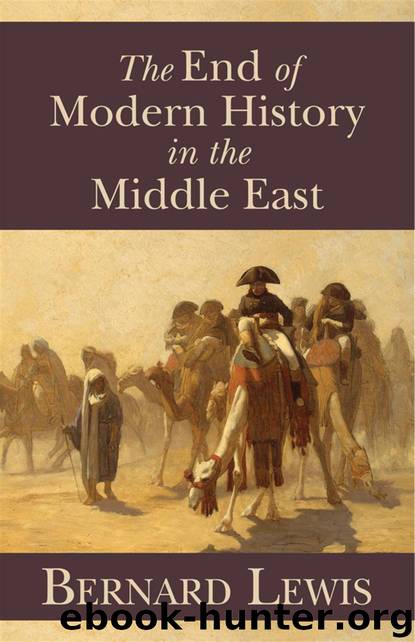The End of Modern History in the Middle East by Bernard Lewis

Author:Bernard Lewis
Language: eng
Format: epub
Tags: Western culture, rulers, leaders, thinkers, challenge, ideas, alienation, liberal
ISBN: 978-0-8179-1296-3
Publisher: Hoover Institution Press
Published: 2011-05-12T04:00:00+00:00
VERBAL PROPAGANDA
Propaganda may be verbal or nonverbal, that is, visual. Verbal propaganda—that is, that conducted in words, may be written or spoken or some combination of the two. The recorded history of propaganda begins with the invention of writing, and indeed, a large proportion of surviving ancient texts may justly be classified under that heading, consisting as they do of statements by rulers proclaiming their greatness, their achievements, their power and often their ambitions or by religious leaders promulgating their doctrines. A major step was the invention of the alphabet and the replacement of the cumbrous writing systems—cuneiform, hieroglyphs and the like—of the most ancient civilizations. With the advent of the alphabet, writing was no longer a specialized craft or mystery, knowledge of which was confined to a small class of priests and scribes. In contrast to the earlier systems of writing, it could easily be taught and mastered, and could bring the message of a written text to a much wider circle. This was still far short of universal literacy, but it was a great improvement on what went before and significantly eased the task of propagandists of every kind.
Written propaganda goes back to remote antiquity and is attested by hard evidence in the most literal sense—writings on stone and metal, proclaiming the name, authority, achievements and claims of the ruler. From early times, these titles and claims were asserted on coins, which passed through many hands; on inscriptions, clear and visible on city gates, in markets and in other public places, as well as on letters and other documents. To these the nineteenth century added two new vehicles—the banknote and the postage stamp. Modern technology has provided a vast new range of means of communication by which the ruler can bring his name, his titles and the claims that these embody to an ever wider public.
The second major advance in the technology of communication, of comparable magnitude with writing, was the invention of printing, which made possible the easy and inexpensive production, on a large scale, of books and pamphlets, newsletters, newspapers and magazines. Printing of a kind was known in China since at least the ninth century; in the mid-eleventh century a Chinese printer introduced a new device—movable type. These were widely used in the Far East, and by the beginning of the fourteenth century had reached Central Asia. During the first half of the fifteenth century these types, previously made of ceramic or wood, were for the first time cast in metal. Between 1440 and 1450 printing from movable, metal types began in Europe. Whether this was copied from the Chinese example or invented independently is disputed among scholars.
There is an interesting contrast in the dissemination of printing and of the paper which it uses. Both were invented in the Far East; both eventually reached Europe, where they enjoyed an enormous development. But the response of the Islamic Middle East to these two inventions was markedly different—a difference that exemplifies the changes that had taken place in Middle Eastern society during the intervening years.
Download
This site does not store any files on its server. We only index and link to content provided by other sites. Please contact the content providers to delete copyright contents if any and email us, we'll remove relevant links or contents immediately.
| Africa | Americas |
| Arctic & Antarctica | Asia |
| Australia & Oceania | Europe |
| Middle East | Russia |
| United States | World |
| Ancient Civilizations | Military |
| Historical Study & Educational Resources |
Empire of the Sikhs by Patwant Singh(23072)
The Wind in My Hair by Masih Alinejad(5091)
Rise and Kill First by Ronen Bergman(4779)
The Templars by Dan Jones(4682)
The Rape of Nanking by Iris Chang(4203)
12 Strong by Doug Stanton(3541)
Blood and Sand by Alex Von Tunzelmann(3195)
Babylon's Ark by Lawrence Anthony(2671)
The History of Jihad: From Muhammad to ISIS by Spencer Robert(2619)
No Room for Small Dreams by Shimon Peres(2365)
The Turkish Psychedelic Explosion by Daniel Spicer(2353)
Inside the Middle East by Avi Melamed(2350)
Gideon's Spies: The Secret History of the Mossad by Gordon Thomas(2337)
Arabs by Eugene Rogan(2292)
The First Muslim The Story of Muhammad by Lesley Hazleton(2267)
Come, Tell Me How You Live by Mallowan Agatha Christie(2253)
Bus on Jaffa Road by Mike Kelly(2150)
Kabul 1841-42: Battle Story by Edmund Yorke(2025)
1453 by Roger Crowley(2022)
